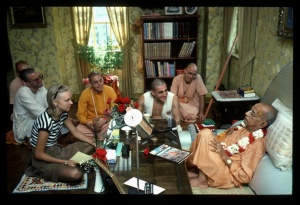CC Madhya 21.33 (1975)

A.C. Bhaktivedanta Swami Prabhupada
Below is the 1996 edition text, ready to be substituted with the 1975 one using the compile form.
TEXT 33
- svayaṁ tv asāmyātiśayas try-adhīśaḥ
- svārājya-lakṣmy-āpta-samasta-kāmaḥ
- baliṁ haradbhiś cira-loka-pālaiḥ
- kirīṭa-koṭīḍita-pāda-pīṭhaḥ
SYNONYMS
svayam—personally the Supreme Personality of Godhead; tu—but; asāmya-atiśayaḥ—who has no equal or superior; tri-adhīśaḥ—the master of three places, namely Goloka Vṛndāvana, Vaikuṇṭhaloka and the material world, or the master of Mahā-Viṣṇu, Garbhodakaśāyī Viṣṇu and Kṣīrodakaśāyī Viṣṇu, or the master of Brahmā, Viṣṇu and Maheśvara, or the master of the three worlds (the higher, lower and middle planetary systems); svārājya-lakṣmī—by His personal spiritual potency; āpta—already achieved; samasta-kāmaḥ—all desirable objects; balim—a presentation or taxation; haradbhiḥ—who are offering; cira-loka-pālaiḥ—by the predominating deities of different planets; kirīṭa-koṭi—by millions of helmets; īḍita—being worshiped; pāda-pīṭhaḥ—whose lotus feet.
TRANSLATION
“‘The Supreme Personality of Godhead, Kṛṣṇa, is the master of the three worlds and the three principal demigods [Brahmā, Viṣṇu and Śiva]. No one is equal to or greater than Him. By His spiritual potency, known as svārājya-lakṣmī, all His desires are fulfilled. While offering their dues and presents in worship, the predominating deities of all the planets touch the lotus feet of the Lord with their helmets. Thus they offer prayers to the Lord.’
PURPORT
This quotation is verse 21 of the Second Chapter, Third Canto, of Śrīmad-Bhāgavatam.